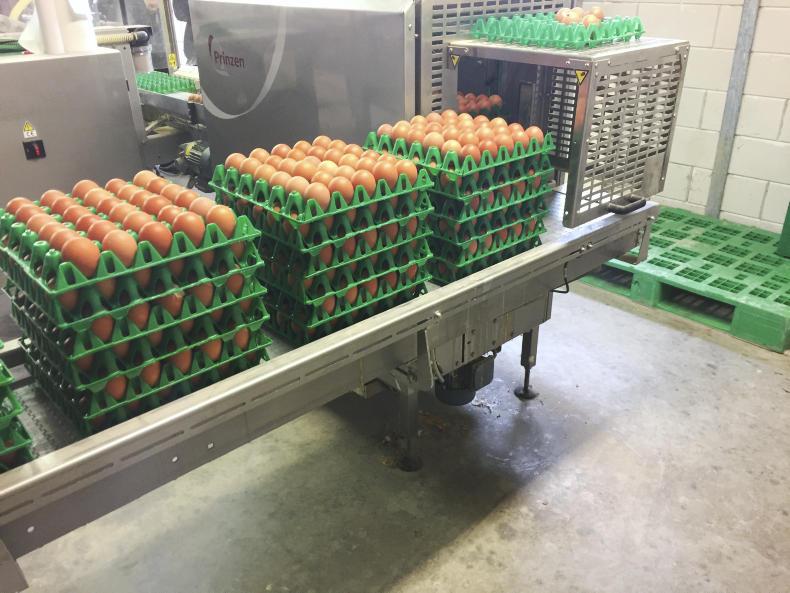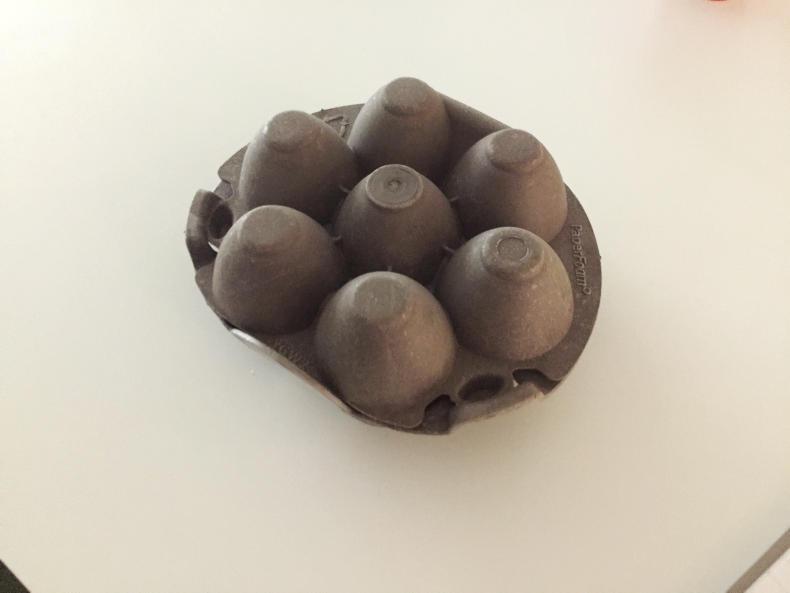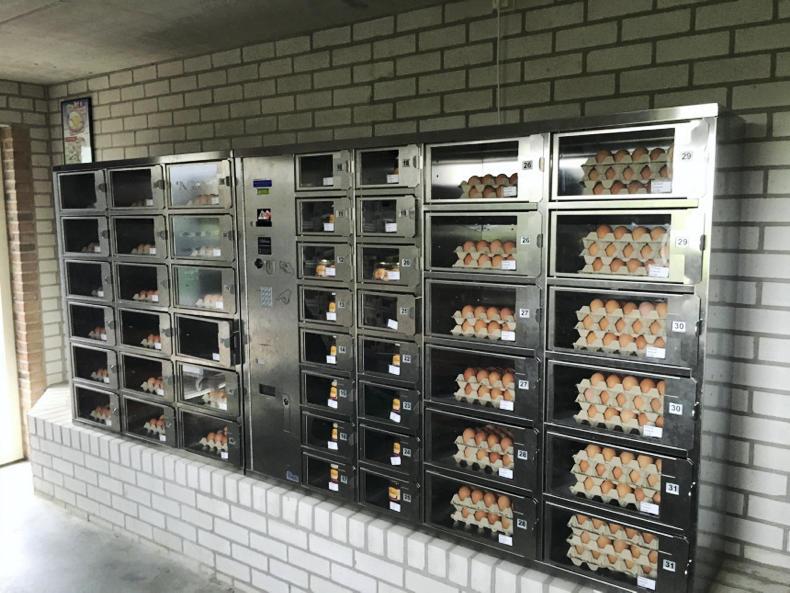In the east of the Netherlands, not far from the border with Germany, is the city of Doetinchem. Like most Dutch cities, you don’t have to travel too far from the city centre until you start to see green paddocks with grazing cows or fields of planted forage crops.
On the southwestern edge of Doetinchem lives Roy Tomesen, a Dutch egg farmer and 2016 Nuffield scholar with about 120,000 layers. Like poultry and pig production, egg farming is heavily commoditised and scaled – intensive production is an absolute necessity to survive.

Roy Tomesen, egg farmer.
“In a typical week we produce 150,000 eggs, selling anywhere between 60,000 to 70,000 of those,” says Tomesen, whose family have been producing eggs for more than 50 years.
“Large egg-packing stations are the only buyer of eggs in the Netherlands. They take the eggs direct from farmers like me, grade them and package the eggs for supermarkets. I typically get a price of 6.5c/egg from the company I sell to,” he adds.
Depending on the price of feed, the costs of production on the farm generally average about 6c/egg, meaning margins are tight in the egg business. Faced with this reality, Tomesen has devised a clever idea to take advantage of his farm’s proximity to the city of Doetinchem, which has a population of 50,000.
At the entrance to his farm, Tomesen has installed a number of self-service egg vending machines that he also stocks with seasonal produce such as honey, strawberries and jams.
“We now have almost 2,000 customers a week who just stop in and take as many eggs as they need. We’re selling about 25,000 eggs per week from the vending machines,” says Tomesen.
This simple innovation has proven a real added value investment for Tomesen. Although he is selling less than 10% of his egg production via these machines, the profit margin is much higher.
The direct relationship with the customer allows him to achieve a market price of 10c/egg, while also saving on the transport costs to the egg packing company.
“Facebook works really well for promoting the egg vending machines,” says Tomesen. “We now have up to 20,000 followers on our social media. I sometimes get people calling me saying they have a big order of 90 eggs and would I have that many eggs. I just tell them: ‘Sure, just come along to the vending machines.’”
With most Dutch consumers almost 20 generations removed from the farm gate, Tomesen has found a unique and positive way to communicate with his customers.
Retail pressure
Similar to most developed countries, a handful of powerful supermarket chains control the retail sector in the Netherlands and increasingly dictate the pricing of eggs to Dutch farmers. However, supermarkets in the Netherlands have come under intense pressure from animal welfare organisations, who are strongly against intensive pig, poultry and egg production.
Prior to the EU-wide ban on battery caged egg production in 2012, animal welfare groups in the Netherlands would pay for radio and television adverts naming and shaming retailers that were stocking caged eggs.
Although the caged egg production system has since disappeared from the Netherlands, animal rights groups are now targeting the barn egg production system, which is the most widespread system now used by Dutch egg farmers.

In a typical week, Roy Tomesen's farm produces 150,000 eggs.
Star rating system
Pressure from animal rights groups has forced Dutch supermarkets to label eggs using a star system to indicate to consumers what system has been used by the farmer to produce the eggs.
Barn-produced eggs have zero stars, while eggs coming from laying hens housed in a winter garden attract one star. A winter garden is a normal poultry house with a veranda extension that allows for extra movement for hens. Free-range eggs get two stars under the ratings system, while organic produced eggs attract the highest rating of three stars.
Tomesen believes the winter garden system, which he houses his layers in, will soon be heading for a zero star rating because of mounting pressure from animal rights groups.
“In a year, I don’t think my eggs will be sold in Dutch supermarkets any more because of the star system,” says Tomesen. “The winter garden system of production is heading for zero stars. In a few years, the only place I will be able to buy my own eggs will be to drive to Germany and get them.”
Like everything in the agri sector in the Netherlands, the Dutch produce more eggs than their domestic need. Less than a third (30%) of Dutch eggs are consumed in the Netherlands, with the remaining 70% exported. Germany is by far the largest export market, taking 85% of exports.

The Rondeel system is a complete egg farm that can house up to 40,000 layer hens.
Sensing the rising opposition to barn egg production, the Dutch poultry housing and egg handling manufacturer Vencomatic has developed a novel new form of layer housing for egg farmers called the Rondeel.
Vencomatic is not an old company by Dutch standards, having been established in 1983 by Cor Van de Ven, who developed the first automatic solution for egg collection in a hen house. Today, the company has sales in 76 markets around the world and operates from its state-of-the-art Venco Campus, which is shaped like an enormous egg.
The Rondeel system is a complete egg farm that can house up to 40,000 layer hens. However, the system is primarily designed to address the animal welfare and environmental challenges facing the modern Dutch egg farmer today, as well as leverage a marketing opportunity from its unique design.
Shaped in a circle, the Rondeel is composed of five houses for layer hens, which offer extra space and a more natural environment to birds than conventional housing. All eggs are collected to the central core of the Rondeel to the egg packing station.

To further promote this high welfare system, Vencomatic invented a unique packaging system that reflects the unique design of the laying house. Breaking away from the traditional format of selling eggs in sixes or 12s, the new Rondeel branded packaging carries eggs in odd numbers such as three, five and seven in circular-shaped cartons.
Further playing into the environmental field, the packaging is all made from wood and potato shavings, making it completely biodegradable.
While Vencomatic has installed just eight of these Rondeel systems to date (seven in the Netherlands and one in China), the company is betting that continued animal welfare pressure in the Netherlands and Europe will force traditional egg farmers to think very differently about their production systems.
In the east of the Netherlands, not far from the border with Germany, is the city of Doetinchem. Like most Dutch cities, you don’t have to travel too far from the city centre until you start to see green paddocks with grazing cows or fields of planted forage crops.
On the southwestern edge of Doetinchem lives Roy Tomesen, a Dutch egg farmer and 2016 Nuffield scholar with about 120,000 layers. Like poultry and pig production, egg farming is heavily commoditised and scaled – intensive production is an absolute necessity to survive.

Roy Tomesen, egg farmer.
“In a typical week we produce 150,000 eggs, selling anywhere between 60,000 to 70,000 of those,” says Tomesen, whose family have been producing eggs for more than 50 years.
“Large egg-packing stations are the only buyer of eggs in the Netherlands. They take the eggs direct from farmers like me, grade them and package the eggs for supermarkets. I typically get a price of 6.5c/egg from the company I sell to,” he adds.
Depending on the price of feed, the costs of production on the farm generally average about 6c/egg, meaning margins are tight in the egg business. Faced with this reality, Tomesen has devised a clever idea to take advantage of his farm’s proximity to the city of Doetinchem, which has a population of 50,000.
At the entrance to his farm, Tomesen has installed a number of self-service egg vending machines that he also stocks with seasonal produce such as honey, strawberries and jams.
“We now have almost 2,000 customers a week who just stop in and take as many eggs as they need. We’re selling about 25,000 eggs per week from the vending machines,” says Tomesen.
This simple innovation has proven a real added value investment for Tomesen. Although he is selling less than 10% of his egg production via these machines, the profit margin is much higher.
The direct relationship with the customer allows him to achieve a market price of 10c/egg, while also saving on the transport costs to the egg packing company.
“Facebook works really well for promoting the egg vending machines,” says Tomesen. “We now have up to 20,000 followers on our social media. I sometimes get people calling me saying they have a big order of 90 eggs and would I have that many eggs. I just tell them: ‘Sure, just come along to the vending machines.’”
With most Dutch consumers almost 20 generations removed from the farm gate, Tomesen has found a unique and positive way to communicate with his customers.
Retail pressure
Similar to most developed countries, a handful of powerful supermarket chains control the retail sector in the Netherlands and increasingly dictate the pricing of eggs to Dutch farmers. However, supermarkets in the Netherlands have come under intense pressure from animal welfare organisations, who are strongly against intensive pig, poultry and egg production.
Prior to the EU-wide ban on battery caged egg production in 2012, animal welfare groups in the Netherlands would pay for radio and television adverts naming and shaming retailers that were stocking caged eggs.
Although the caged egg production system has since disappeared from the Netherlands, animal rights groups are now targeting the barn egg production system, which is the most widespread system now used by Dutch egg farmers.

In a typical week, Roy Tomesen's farm produces 150,000 eggs.
Star rating system
Pressure from animal rights groups has forced Dutch supermarkets to label eggs using a star system to indicate to consumers what system has been used by the farmer to produce the eggs.
Barn-produced eggs have zero stars, while eggs coming from laying hens housed in a winter garden attract one star. A winter garden is a normal poultry house with a veranda extension that allows for extra movement for hens. Free-range eggs get two stars under the ratings system, while organic produced eggs attract the highest rating of three stars.
Tomesen believes the winter garden system, which he houses his layers in, will soon be heading for a zero star rating because of mounting pressure from animal rights groups.
“In a year, I don’t think my eggs will be sold in Dutch supermarkets any more because of the star system,” says Tomesen. “The winter garden system of production is heading for zero stars. In a few years, the only place I will be able to buy my own eggs will be to drive to Germany and get them.”
Like everything in the agri sector in the Netherlands, the Dutch produce more eggs than their domestic need. Less than a third (30%) of Dutch eggs are consumed in the Netherlands, with the remaining 70% exported. Germany is by far the largest export market, taking 85% of exports.

The Rondeel system is a complete egg farm that can house up to 40,000 layer hens.
Sensing the rising opposition to barn egg production, the Dutch poultry housing and egg handling manufacturer Vencomatic has developed a novel new form of layer housing for egg farmers called the Rondeel.
Vencomatic is not an old company by Dutch standards, having been established in 1983 by Cor Van de Ven, who developed the first automatic solution for egg collection in a hen house. Today, the company has sales in 76 markets around the world and operates from its state-of-the-art Venco Campus, which is shaped like an enormous egg.
The Rondeel system is a complete egg farm that can house up to 40,000 layer hens. However, the system is primarily designed to address the animal welfare and environmental challenges facing the modern Dutch egg farmer today, as well as leverage a marketing opportunity from its unique design.
Shaped in a circle, the Rondeel is composed of five houses for layer hens, which offer extra space and a more natural environment to birds than conventional housing. All eggs are collected to the central core of the Rondeel to the egg packing station.

To further promote this high welfare system, Vencomatic invented a unique packaging system that reflects the unique design of the laying house. Breaking away from the traditional format of selling eggs in sixes or 12s, the new Rondeel branded packaging carries eggs in odd numbers such as three, five and seven in circular-shaped cartons.
Further playing into the environmental field, the packaging is all made from wood and potato shavings, making it completely biodegradable.
While Vencomatic has installed just eight of these Rondeel systems to date (seven in the Netherlands and one in China), the company is betting that continued animal welfare pressure in the Netherlands and Europe will force traditional egg farmers to think very differently about their production systems.










 This is a subscriber-only article
This is a subscriber-only article












SHARING OPTIONS: